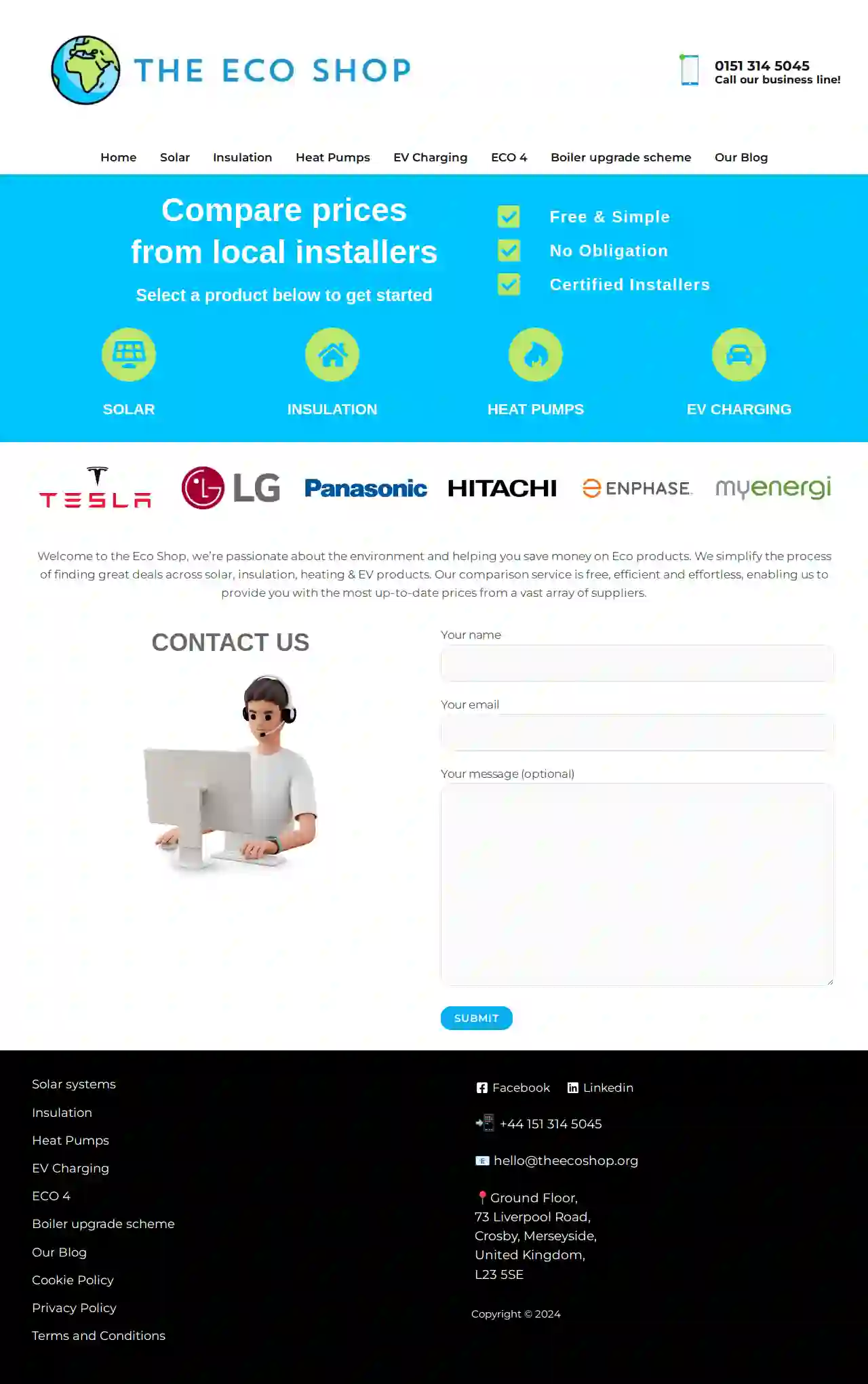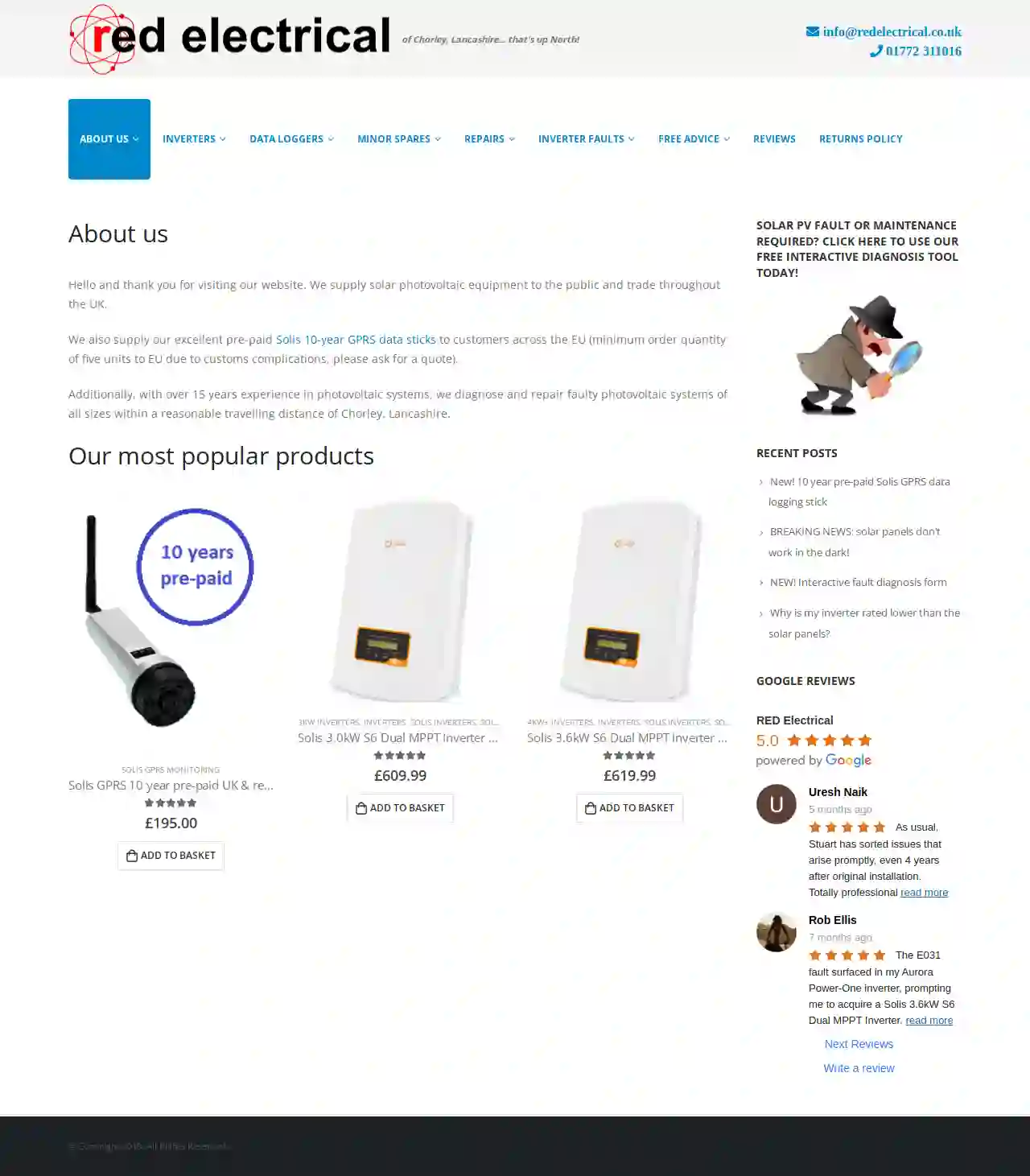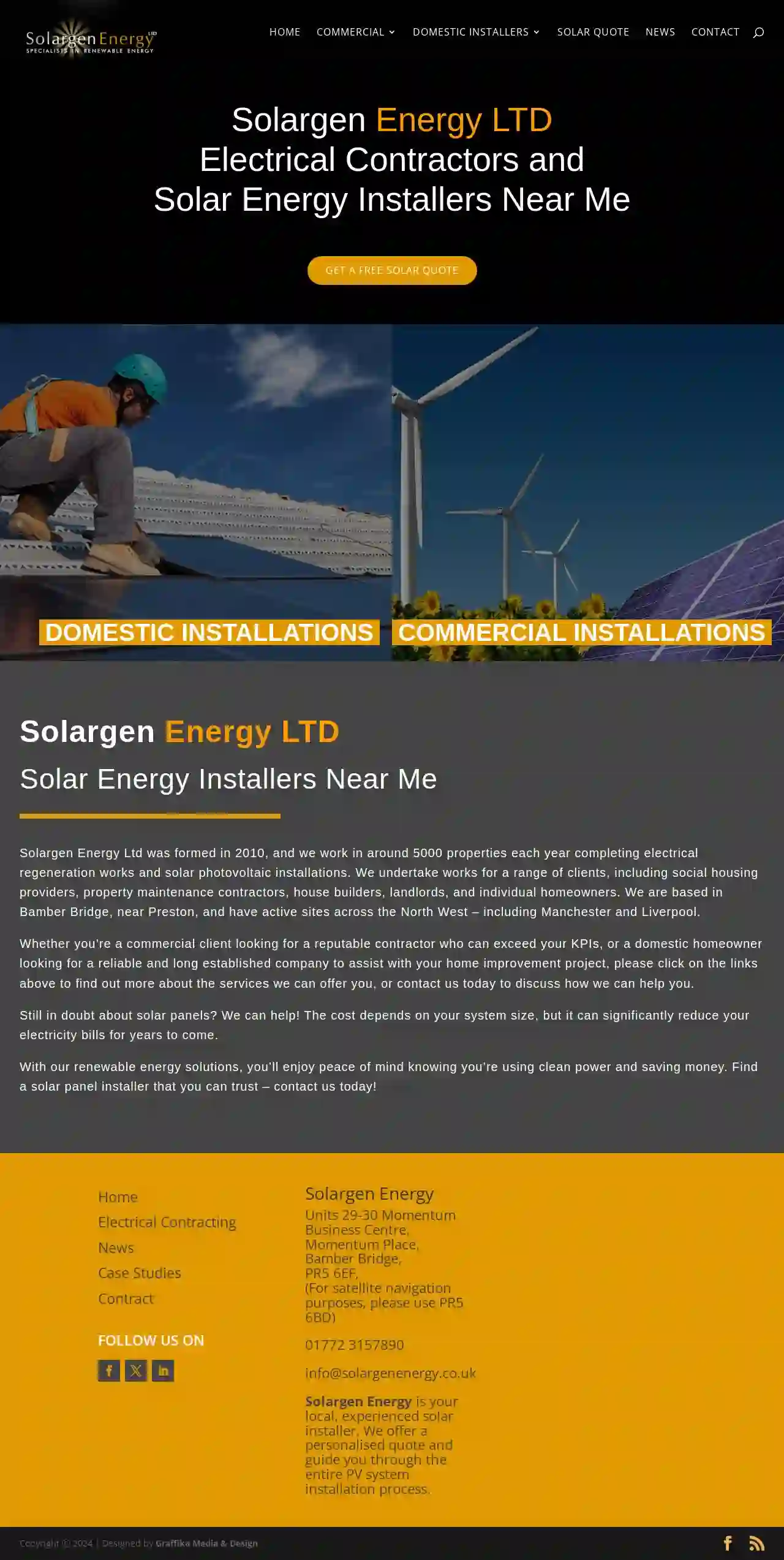Solar Installers Hesketh Bank
Find Solar Installers Near Me in Hesketh Bank
Receive 3 FREE Solar Energy Company quotes for your project today! Compare profiles, reviews, accreditations, portfolio, etc... and choose the best offer.

CPSL Group
3.810 reviewsUnit 4 Thomas Street, Congleton, CW12 1QU, GBCPSL Group are dedicated to delivering the highest quality systems and services in the Renewable Energy Industry. With our Head Office located in the heart of Lancashire & Development Centre in Cheshire, we are perfectly situated to work all over the United Kingdom, offering a wide range of options to you or your business. CPSL Group supply, install & service a wide range of energy saving technologies including Solar Panels, Wind Turbines, Battery Storage & Electric Vehicle Charge Points. Our team of highly technical & experienced individuals will ensure you receive, not only the best systems on the market, but will provide the most cost effective option, producing the best energy savings and returns for you.
- Services
- Why Us?
- Accreditations
- Our Team
- Testimonials
- Gallery
Get Quote
QPG Energy
Chorley, GBQPG Energy provides businesses and homeowners with a no-fee, renewable energy procurement service. Our experienced team of industry experts will find you the best green energy deals on the market and even negotiate bespoke energy contracts. We’ll also find you the most energy-efficient technologies, including on-site energy generation solutions. Get your free quote! QPG ENERGY –Your First Choice Green Energy Consultant
- Services
- Why Us?
- Accreditations
- Our Team
- Gallery
Get Quote
EMBS Limited
Electrical Mechanical Building Services Limited, GBAt EMBS we are proud to offer specialised installation services in all aspects of the electrical industry. We have extensive experience company wide whether that be; install, fault finding and repair, inspection and testing, or EV charger installation. At EMBS, we work as a team to ensure we meet the client's expectation of any project. We carry out all aspects of electrical installation, repair, testing and inspection for our clients and take on jobs of all sizes.
- Services
- Why Us?
- Gallery
Get Quote
The Eco Shop Ltd
73 Liverpool Road, Crosby, Ground Floor, L23 5SE, GBWelcome to the Eco Shop, we’re passionate about the environment and helping you save money on Eco products. We simplify the process of finding great deals across solar, insulation, heating & EV products. Our comparison service is free, efficient and effortless, enabling us to provide you with the most up-to-date prices from a vast array of suppliers.
- Services
- Why Us?
- Gallery
Get Quote
RED Electrical
5108 reviewsChorley, GBHello and thank you for visiting our website. We supply solar photovoltaic equipment to the public and trade throughout the UK. We also supply our excellent pre-paid Solis 10-year GPRS data sticks to customers across the EU (minimum order quantity of five units to EU due to customs complications, please ask for a quote). Additionally, with over 15 years experience in photovoltaic systems, we diagnose and repair faulty photovoltaic systems of all sizes within a reasonable travelling distance of Chorley, Lancashire.
- Services
- Why Us?
- Our Team
- Testimonials
- Gallery
Get Quote
Off-Grid Northwest Ltd
Unit 10 Manor Park, Garstang, PR3 1NJ, GBOff-Grid North West, a leading one-stop solution for ev charger and solar panel installation in Lancashire. Solar Power Installation Lancashire Welcome to Off-Grid Northwest, specialists in supply and installation of solar battery storage solutions. Our MCS registered electricians are ready to introduce you to the world of renewable energy so you can stand on your own two feet. Renewable energy self-consumption is becoming increasingly popular in our more environmentally conscious society. Off-Grid Northwest aim to help our customers benefit financially whilst also improving their green credentials! Solar Panel Installation EV Charger Installation Case Studies Off Grid North West Accreditations Solar Panels Lancashire Welcome to Off-Grid North West, specialists in supply and installation of solar panel installation in Lancashire and the North West. Our MCS registered electricians are ready to introduce you to the world of renewable energy so you can stand on your own two feet. Renewable energy self-consumption is becoming increasingly popular in our more environmentally conscious society. Off-Grid North West aim to help our customers benefit financially whilst also improving their green credentials. As leading solar installers in Lancashire our solar PV system does three incredible things. It reduces your reliance on fossil fuels Pays for itself over time Allows you to make money You don't need to look far to see a solar panel on a home or building in the UK. Thousands of homes and businesses have benefited from the boom in solar power in the last ten years. And what's not to like? A consumer or business investment in solar helps our global struggle to reduce reliance on fossil fuels and boosts our efforts to bring our energy systems into the 21st century. Solar power is poised for huge demand globally in the coming years as the technology develops - the cost of panels is dropping and the efficiency of each cell increasing. We think it's the future of energy even in a relatively cloudy country such as the UK. Looking to install solar panels in Lancashire - call our team today for a free no obligation quotation. Solar Installers Lancashire Solar PV panels, or solar photovoltaic panels, can convert solar energy into electricity. Solar energy is only produced during daylight hours when houses are unoccupied, and when the electricity demand is at its lowest. Generally, this electricity is fed back into the grid for small financial gain and feed in tariffs are no longer available for new applications. Looking For Affordable Solar Panels in Lancashire? As leading solar installers in Lancashire our team know that most owners of solar PV systems only use around 40% of their generated electricity, with the remainder being exported to the National Grid. Installation of a solar battery storage solution enables customers benefiting from solar PV to self-consume more of the electricity produced by charging the unused excess electricity into a solar battery storage solution. For example, the batteries will charge during the day in preparation for use in an evening when the property is occupied. Installation of a solar PV battery storage system effectively means you are forward buying your electricity for a set cost and protected against rapidly rising energy costs. With gas and electric bills increasing now is the time to install solar panels at your property. Investing in solar panels has many benefits including reduced energy bills, better tariffs with energy providers, and contributing to a more economical and environmentally friendly nation. An Off-Grid North West our team offer solar panel installation in Lancashire and a solution that will enable the consumer to benefit from solar energy both day and night. Our customers are benefitting from full installations of solar PV panels and battery storage solution
- Services
- Why Us?
- Accreditations
- Gallery
Get Quote
Nightingale Energy - Solar Panel Installation
515 reviewsSt Andrews Place, Hill Lane, St Andrews Place Hill Lane, Bolton, BL6 5JW, GBSolar Panel Services across the North West & UK A Division of Nightingale Electrical (Bolton) Ltd Get Free Estimate Solar Panel Installation and Maintenance in the UK Since 2011, Nightingale Energy has been providing solar panel installation and maintenance across the UK's North West, including Bolton, Wigan, Chorley, and Manchester. As energy costs rise, solar panels are an effective way to reduce bills and promote eco-friendly living. Our expert team offers comprehensive services from design to maintenance. Contact us to learn more or discuss solar solutions for your home or business. About Us Our Services We are dedicated to providing homes and businesses across the North West with a variety of renewable energy solutions. If you’d like to find out more about any of our services listed below, please don’t hesitate to give us a call on 01204 325177. Solar Inverter Replacement If you believe that your existing solar PV is underperforming, our team of solar energy specialists is on hand to provide inverter replacements across the North West and the UK! Find Out More Battery Storage Our team of specialists are here to advise on the best location to install your battery storage system which will capture the electricity that is generated from your solar panels. Find Out More SolarEdge Upgrade SolarEdge upgrades are now available to ensure you are getting maximum performance from your solar panels, including the ones in more shaded areas. Find Out More Solar Panel Installation To upgrade your home’s energy system to solar renewable energy, start discussing your options with Nightingale Energy today. Find Out More Maintenance and Servicing Should any problems occur with your solar panels, Nightingale Energy are here to provide any maintenance and servicing you should need to ensure they are working to their full potential. Find Out More Solar Panel Pest Control If you’ve noticed birds (often pigeons) nesting within your solar panels, this can cause smells, an excess of droppings and noise on your roof area, and can be a real nuisance. Our team are available to provide pest proofing for your solar panels, helping you alleviate the problem. Find Out More Car Charger Installation An electric car is a great way to start living more eco-friendly. To install your solar-powered car charger for your North West home, give our team a call today. Find Out More How We Serve We can talk you through the basics to fault find the issue and recommend the best solution, or you can book a visit with one of our engineers to investigate the errors for you.Warranty We are proud to be part of the team of award-winning solar panel installers who by installing a 50kW Solar PV System at Bodnant Gardens, which won 1st Place in Solar Installation of the Year.
- Services
- Why Us?
- Gallery
Get Quote
Solargen Energy Ltd
3.45 reviewsMomentum Place, Units 29-30 Momentum Business Centre, Bamber Bridge, PR5 6EF, GBSolargen Energy LTD is a team of fully qualified and experienced electrical contractors and solar energy installers based in Lancashire, covering the whole of the North West. We have been working within the social housing and new build sectors for almost 15 years, providing services to a large number of clients across a variety of projects. Since our formation in 2010, we have worked on around 5000 properties each year, completing electrical regeneration works and solar photovoltaic installations. Our clients include social housing providers, property maintenance contractors, house builders, landlords, and individual homeowners. We are based in Bamber Bridge, near Preston, and have active sites across the North West, including Manchester and Liverpool. Whether you are a commercial client looking for a reputable contractor who can exceed your KPIs, or a domestic homeowner looking for a reliable and long-established company to assist with your home improvement project, please click on the links above to find out more about the services we can offer you, or contact us today to discuss how we can help you. Still unsure about solar panels? We can help! The cost depends on your system size, but it can significantly reduce your electricity bills for years to come. With our renewable energy solutions, you’ll enjoy peace of mind knowing you’re using clean power and saving money. Find a solar panel installer that you can trust – contact us today!
- Services
- Why Us?
- Gallery
Get Quote
Smart Solar Solution
Chorley, GBWelcome to Solar Smart Solutions, your leading provider of cutting-edge solar photovoltaic (PV) solutions tailored exclusively for commercial, agricultural and domestic properties. We provide solar to companies nationwide and will not be beaten on price or service. Discover the benefits of solar PV to your business today and get in touch. As a leading provider of solar solutions, we empower residential, corporate, and agricultural customers to embrace renewable energy and make a significant impact on their energy consumption, carbon footprint, and overall sustainability. At Smart Solar Solution, we are not just a company; we are a catalyst for change. Through our commitment to innovation, education, and sustainability, we envision a world where clean energy empowers us all to thrive while preserving our planet’s precious resources. Our mission at Smart Solar Solution is to revolutionise the way energy is consumed by providing innovative and reliable solar solutions. We aim to empower individuals, businesses, and communities to transition towards clean and renewable energy sources, reducing their reliance on traditional power grids and minimising environmental impact. Through our expertise, cutting-edge technology, and unwavering commitment to excellence, we strive to make solar energy accessible, affordable, and seamlessly integrated into every aspect of modern life. Our Goals Empowerment Through Education: We are committed to educating our customers about the benefits of solar energy, how it works, the long- term impact it can have on their lives and how it can align with their environmental and financial goals. Innovation in Technology: We continuously invest in research and development to stay at the forefront of solar technology. Our aim is to provide the most efficient, durable, and advanced solar solutions to our customers. Tailored Solutions: Every customer is unique, and so are their energy needs. Our goal is to provide customised solar solutions that meet the specific requirements of each residential, corporate, or agricultural client. We work closely with our customers to design and implement systems that optimise energy production, storage, and utilisation. Environmental Responsibility: Our solar solutions are designed to significantly reduce greenhouse gas emissions and promote a cleaner atmosphere. We actively support the global shift towards renewable energy as a means to combat climate change and preserve our planet for future generations. Customer Satisfaction: Our customers are at the heart of everything we do. We are dedicated to providing exceptional service, from initial consultation to system installation and ongoing support. Our goal is to exceed customer expectations by delivering reliable, high-quality solar solutions that enhance their lives and contribute positively to their communities. Community Engagement: We recognise the importance of community engagement in promoting sustainable practices. We strive to actively engage with local communities, educational institutions, and organisations to raise awareness about solar energy’s benefits and its potential to drive positive change.
- Services
- Why Us?
- Testimonials
- Gallery
Get Quote
chorley renewables limited
53 reviewsLancaster St., Nirvada House, Chorley, PR7 4QB, GBChorley Renewables is a leading renewable energy solutions company dedicated to securing tomorrow's energy today. We specialize in providing high-quality solar panel installations, battery storage systems, and electric vehicle charging solutions for both domestic and commercial clients in Lancashire. As an environmentally conscious company, we believe in offering sustainable energy solutions that benefit both our customers and the planet. Our team of expert engineers has extensive experience in the industry and is committed to delivering exceptional workmanship and customer service. We pride ourselves on using only the latest technologies and products, such as Solax Hybrid Inverters and Longi High Efficiency Solar Panels, to ensure optimal performance and efficiency for our clients. All our installations come with comprehensive warranties and guarantees, providing peace of mind and long-term value. Whether you're looking to reduce your energy bills, minimize your carbon footprint, or simply embrace a greener lifestyle, Chorley Renewables is your trusted partner for all your renewable energy needs.
- Services
- Why Us?
- Gallery
Get Quote
Over 3,485+ Solar Installers onboarded
Our solar pros operate in Hesketh Bank & beyond!
SolarCompaniesHub has curated and vetted Top Solar Companies in Hesketh Bank. Find a reliable business today.
Frequently Asked Questions About Solar Installers
- Monocrystalline: Made from a single silicon crystal, known for high efficiency (typically 18-22%) and sleek black appearance.
- Polycrystalline: Made from multiple silicon crystals, slightly less efficient (15-17%) but often more affordable than monocrystalline.
- Thin-film: Made from thin layers of photovoltaic material, lower efficiency (8-12%) but can be flexible and lightweight.
What are the different types of solar panels?
What happens if my roof needs to be replaced after I install solar panels?
What is net metering, and how does it work?
Will solar panels work during cloudy days or at night?
What are the different types of solar panels?
- Monocrystalline: Made from a single silicon crystal, known for high efficiency (typically 18-22%) and sleek black appearance.
- Polycrystalline: Made from multiple silicon crystals, slightly less efficient (15-17%) but often more affordable than monocrystalline.
- Thin-film: Made from thin layers of photovoltaic material, lower efficiency (8-12%) but can be flexible and lightweight.